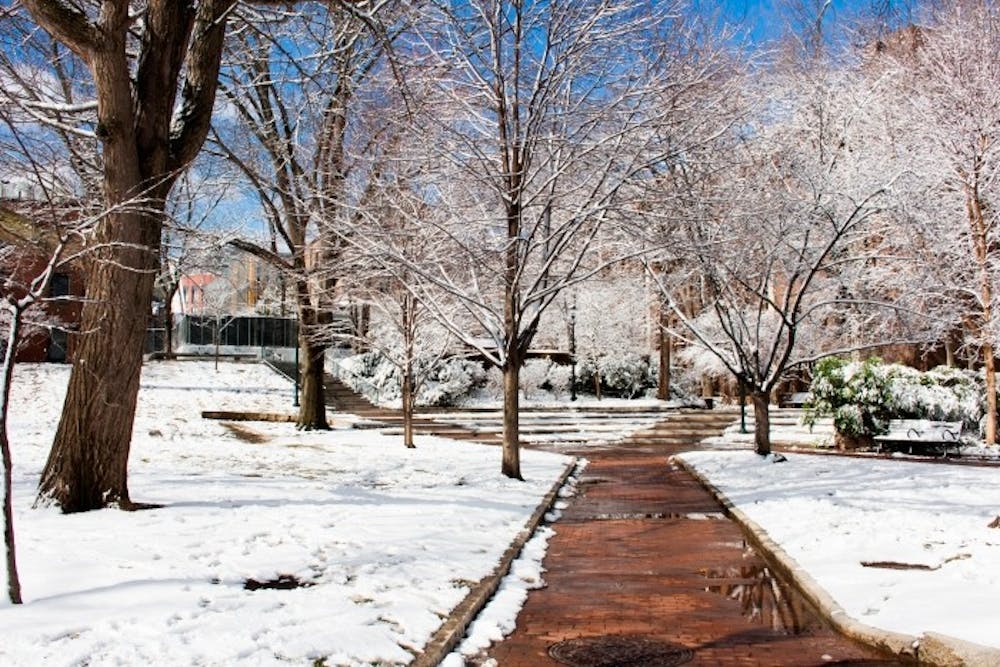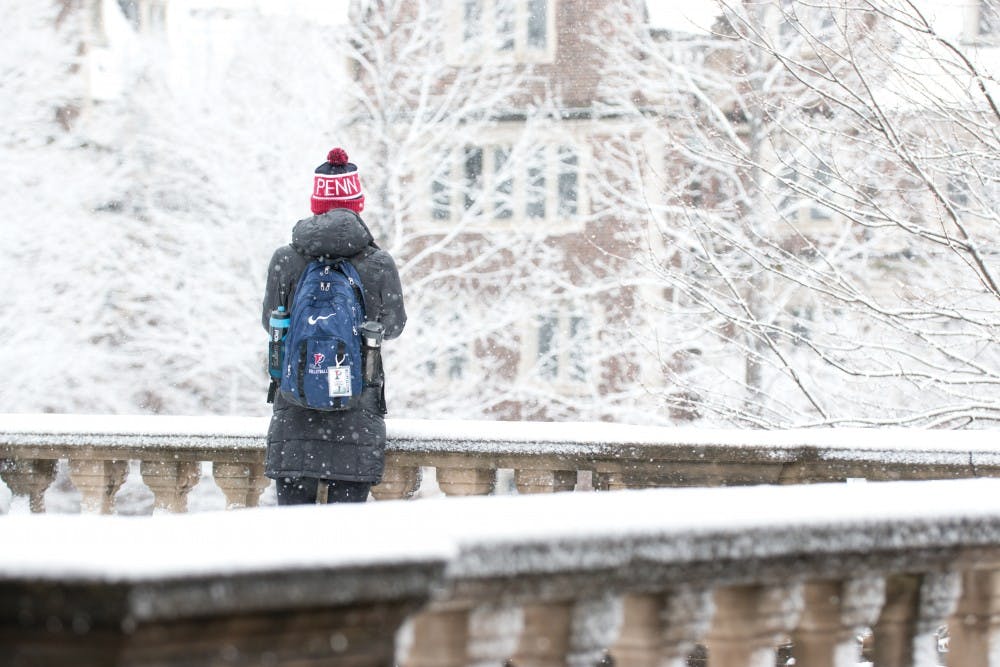
Before the bulk of students began flooding back onto campus, a series of extreme weather conditions during the first few days of January prompted administrators to "suspend normal University operations" on two consecutive business days. But the process through which administrators determine whether or not — and for how long — to suspend operations involves several factors and is far more complicated than it might seem.
A few days before classes were set to begin, Penn notified students, staff, and faculty on Jan. 5 and again on Jan. 8 of suspended operations. This decision, according to Executive Vice President Craig Carnaroli, is made by four parties: Provost Wendell Pritchett, Vice President for Public Safety Maureen Rush, Deputy Chief of Tactical & Emergency Readiness for the Division of Public Safety Michael Fink, and Carnaroli himself.
Leading up to a projected storm, the four administrators discuss the school closing on the phone the night before typically between 8 and 10 p.m., Carnaroli said. They make the final decision in another phone call at 5 a.m. the day of the expected inclement weather conditions.
“We have a pretty well-oiled machine when it comes to any change in the operating status of the University,” Rush said.
Decisions regarding University closings can be made later in the day as well, such as on Jan. 8, when unexpectedly worsening weather conditions prompted the administrators to suspend University operations at 1 p.m.
There are other factors, however, that are considered before canceling operations. Rush said, for example, had school been in session during either of the two days with suspended operations in January, the decision might not have been the same.
"[You] have to think of the number of academic days," Rush said, adding that University operations would not have been suspended on Jan. 8 if school had started. There are a certain number of school days that all universities must have, and that often influences the decision of whether or not to suspend operations.

When considering closing the University, Carnaroli added that administrators consult city officials, public transportation schedules, and maintenance crews' perspectives before making a final decision. They also confer with public school officials to account for child-care considerations that might affect staff or faculty with children.
“These decisions are never taken lightly, and it’s hard to please all of the people,” Carnaroli said.
Rush said the administrators decided not to close the University on Jan. 4 since the trajectory and timing of the incoming “bomb cyclone” storm was uncertain.
The Assistant to the Faculty Director at the Kelly Writers House Lily Applebaum said that she believed the University should have closed school that Thursday.
“I understand that if it’s just a couple of inches of snow, anyone should be able to get to where they’re going,” Applebaum said. “But I also just think we live somewhere where it doesn’t happen as frequently, so it feels to me to be better safe than sorry to cancel if the weather is going to be questionable.”
When normal University operations are suspended, the institution retains its essential staff. Rush said these essential staff members include public safety, hospital, business services, transportation, recreation center, and library staff. "Non-essential staff" include University faculty and administrators who were not categorized as essential in their initial hiring contracts, Rush said.
Carnaroli noted that some researchers in the medical school are also considered essential staff.
Carnaroli said that essential staff members who are unable to get home because of weather conditions can stay in the Sheraton Hotel at no cost. However, if essential staff members feel that they are unable to report to work, unlike Penn's other staffers, they are not paid for the day.
“Typically, what happens is that they would not get paid for that day if they did not report, but this is where flexibility and judgement comes into play,” Carnaroli said. “If there’s extenuating circumstances, there might be exceptions.”
Caranoli said that the frequency of University closings during winter break were in part due to the fact that classes for the semester had yet to begin. When school is in session, he said that exam cycles are also factored into the possible disruption in class schedule.
“When students are here, we have to be mindful that students are here,” Caranoli said. “We have to be able to respond to emergencies.”
“We are very reluctant to close until we absolutely have to during the academic semester,” he added.
Applebaum said that she hoped the decision to cancel classes due to inclement weather conditions would be left up to the instructors.
"Perhaps different from a student perspective, I don't really want class to be canceled," Applebaum added. "If your professor lives very far away, they could say, 'There's school today, but I can't come in so we'll arrange something different.'"
Senior News Editor Sarah Fortinsky contributed reporting.
The Daily Pennsylvanian is an independent, student-run newspaper. Please consider making a donation to support the coverage that shapes the University. Your generosity ensures a future of strong journalism at Penn.
Donate




